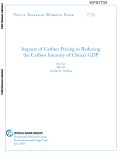The Green Economy (GE) paradigm aims to reconcile environmental and socio-economic objectives. Policies to deploy renewable energy (RE) are widely perceived as a way to tap the potential synergies of these objectives. It is, however, still largely unclear whether the potential of simultaneously achieving both environmental and socio-economic objectives can be fully realized, and whether and how multiple objectives influence policy design, implementation, and evaluation. We aim to contribute to this aspect of GE research by looking at selected country experiences of renewable energy deployment with respect to the socio-economic goals of job creation or energy access. Across the cases examined, we find the following implications of relevance for the GE framework: First, we confirm the important role of governmental action for GE, with the specific need to state objectives clearly and build monitoring capacity. Second, consistent with the “strong” green growth variant of GE, some of the cases suggest that while renewable deployment may indeed lead to short-term socio-economic benefits, these benefits may not last.
This document elaborated by the Global Green Growth Institute (GGGI) and the German Development Institute (DIE) conducts an in-depth exploration of the statistics of the National Household Surveys (ENAHO) 2004-2013 and disaggregates essential information on the conditions of the populations that depend on the forest for their welfare.
This analysis conducted by the Global Green Growth Institute (GGGI), the German Development Institute (DIE) and UNIQUE examines the growth potential for timber products nationwide and provides detailed recommendations in four priority chains: pre-sized dry sawnwood, fiberboard and particleboard, pallets, and wooden furniture.

In contributing to global climate change mitigation efforts as agreed in Paris in 2015, China has set a target of reducing the carbon dioxide intensity of gross domestic product by 60-65 percent in 2030 compared with 2005 levels. Using a dynamic computable general equilibrium model of China, this study analyzes the economic and greenhouse gas impacts of meeting those targets through carbon pricing. The study finds that the trajectory of carbon prices to achieve the target depends on several factors, including how the carbon price changes over time and how carbon revenue is recycled to the economy. The study finds that carbon pricing that starts at a lower rate and gradually rises until it achieves the intensity target would be more efficient than a carbon price that remains constant over time. Using carbon revenue to cut existing distortionary taxes reduces the impact on the growth of gross domestic product relative to lump-sum redistribution. Recycling carbon revenue through subsidies to renewables and other low-carbon energy sources also can meet the targets, but the impact on the growth of gross domestic product is larger than with the other policies considered.
